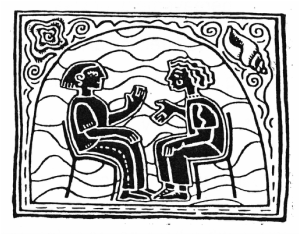|
What is Person-Centred Experiential Therapy?
Counselling and psychotherapy practitioners understand their work from a variety of perspectives. There are a variety of well-established 'models' or 'approaches' and these generally hold many insights in common, whilst also having their own specific contributions and characteristics (click here for a brief summary of these from BACP). My work is firmly but flexibly rooted in person-centred experiential approaches. This approach to therapy originated in the work of psychologist, therapist, educator, and researcher, Carl R. Rogers (1902-1987), who was the initiator not only of what he called 'Client Centred Therapy' but also of innovative approaches to education, human relations, and community-building. In the decades since his death, the approach has been developed by practitioners and theorists in many parts of the world, and notably in Scotland. These developments have led to a number of different emphases in working, collectively now described as 'Person-centred and Experiential Psychotherapies' (PCE), which have a long-established, robust, and developing evidence base. This is on top of that for humanistic therapies more generally. Indeed, in the 1940's Carl Rogers was one of the pioneers of psychotherapy research, leading the way in detailed scientific investigation about when and how therapy is effective. There continues to be a strong tradition of research and innovation amongst contemporary person-centred experiential practitioners, researchers and academics Person-centred experiential therapy is based on respect for the individual person and their unique experience and perspective, and on the understanding that the therapeutic relationship between counsellor and client, is of primary importance in the work. It is a relational therapy. As a person-centred experiential therapist, I take it as a given that it is ultimately you - not me - who can identify best what is problematic and what direction may need to be taken, even if this may not initially be at all clear to you. We have within ourselves the capacity to begin and continue healing and restorative processes, and these processes can best unfold within the secure, non-judging, understanding relationship that person-centred therapists are trained for and strive to participate in. The essential qualities I see as central to creating a safe, supportive and challenging therapeutic environment include:
You can watch a short video of Carl Rogers speaking about his approach here. For more information about person-centred approaches to counselling and psychotherapy the following links may be helpful: The World Association for Person-Centered and Experiential Psychotherapy and Counseling The Person-Centred Association (UK) Person-Centred Therapy Scotland
|
'The good life is a process, not a state of being. It is a direction not a destination.' 'The kind of caring that the client-centered therapist desires to achieve is a gullible caring, in which clients are accepted as they say they are, not with a lurking suspicion in the therapist's mind that they may, in fact, be otherwise. This attitude is not stupidity on the therapist's part; it is the kind of attitude that is most likely to lead to trust'. 'When I have been listened to and when I have been heard, I am able to re-perceive my world in a new way and to go on. It is astonishing how elements that seem insoluble become soluble when someone listens, how confusions that seem irremediable turn into relatively clear flowing streams when one is heard. I have deeply appreciated the times that I have experienced this sensitive, empathic, concentrated listening.' 'This process of the good life is not, I am convinced, a life for the faint-hearted. It involves the stretching and growing of becoming more and more of one's potentialities. It involves the courage to be. It means launching oneself fully into the stream of life'. Carl Rogers |

